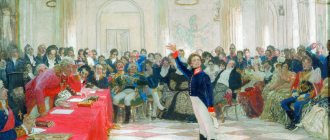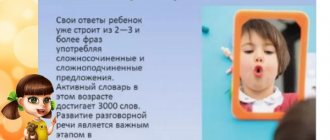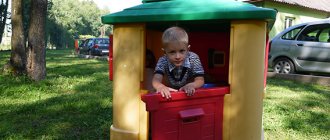In Russian psychology, not much is said about sensitive periods of child development. The definition states that age-related sensitivity is “an optimal combination of conditions inherent in a specific age period for the development of certain mental properties or processes.” At the same time, it is emphasized that “premature or delayed training in relation to the period of age-related sensitivity may not be effective enough, which adversely affects the development of the psyche.”
Agree, nothing is clear. Let's turn to additional sources, namely what Maria Montessori wrote about this.
So, sensitive periods are called periods of special receptivity of children to certain types of activities and to methods of emotional response, behavior, etc. That is, in fact, the child will never learn anything with such ease as in the corresponding skill sensitive period. The main task of parents is to monitor their child, since sensitive periods are both universal and individual. It is important to catch the right moment.
Why do we need knowledge about sensitive periods of baby development?
It’s simple: to prepare the appropriate environment and give the child the opportunity to promptly exercise his senses, social life skills, speech, etc. The thing is that sensitive periods last a certain time and pass irrevocably, they cannot be returned.
Parents cannot in any way influence the sensitive period itself, but they are able to:
- know the characteristics of each period, so as not to fight the natural nature of the child;
- anticipate the onset of the next sensitive period and have time to prepare the appropriate environment so that the child has what he especially needs at this particular moment.
Sensitive periods of development are universal
, that is, they arise during the development of all children, regardless of race, nationality, pace of development, geopolitical, cultural differences, etc.
Sensitive periods of development vary from person to person
, when it comes to the time of their occurrence and duration in a particular child. Biological age may not correspond to psychological age.
Sources
- Yu Y., Yang X., Wang S., Wang H., Chang R., Tsamlag L., Zhang S., Xu C., Yu X., Cai Y., Lau JTF. Serial multiple mediation of the association between internet gaming disorder and suicidal ideation by insomnia and depression in adolescents in Shanghai, China. // BMC Psychiatry - 2021 - Vol20 - N1 - p.460; PMID:32967648
- Macari S., Milgramm A., Reed J., Shic F., Powell KK., Macris D., Chawarska K. Context-Specific Dyadic Attention Vulnerabilities During the First Year in Infants Later Developing Autism Spectrum Disorder. // J Am Acad Child Adolesc Psychiatry - 2021 - Vol60 - N1 - p.166-175; PMID:32061926
- Carson V., Kuzik N. Demographic correlates of screen time and objectively measured sedentary time and physical activity among toddlers: a cross-sectional study. // BMC Public Health - 2021 - Vol17 - N1 - p.187; PMID:28193271
- Radesky JS., Silverstein M., Zuckerman B., Christakis DA. Infant self-regulation and early childhood media exposure. // Pediatrics - 2014 - Vol133 - N5 - p.e1172-8; PMID:24733868
Sensitive period of speech development
Lasts on average from 0 to 6 years.
Under one year of age:
Children learn to imitate sounds.
Around 1 year of age:
The baby consciously pronounces the first word; for the first time in his life there is a verbal expression of thought.
At about 1.5 years of age:
The baby begins to express his feelings and desires. It is important to understand that the child is able to perceive the grammatical norms of the language and is able to formulate a sentence grammatically accurately.
What does it mean?
At the age of 2.5 - 3 years
The baby often talks to himself. This is an opportunity to eavesdrop on his thoughts, see the logic or illogicality of thinking in them.
At the age of 3.5 - 4 years
: the child actively expands his vocabulary, enjoys talking, composing and telling stories.
Recommendation:
With a child, there is no need to lisp and simplify the language to “childish”. On the contrary, he needs to be introduced to the richness of his native language, its diversity.
Children of this age are keenly interested in the symbolic designation of sounds - letters, enthusiastically trace letters from rough paper, etc.
Therefore, at the age of 4.5 - 5 years
It seems completely natural that the child begins to write individual words and numbers of his own free will and tries to write his name.
Finally, at about 6 years
the child is ready and wants to learn to read.
If a child has to do something outside the framework of the corresponding sensitive period, that is, under duress (learn to read, write, etc.), then he comes to the result later or does not come at all.
About the role and significance for parents
Each such period is characterized by certain specific development:
- the onset is slow and difficult to detect, so specific age intervals must be precisely known;
- the maximum point is the greatest degree of manifestation of the sign, maximum intensity, it can be identified without problems;
- decline, gradual decrease in intensity.
To understand the essence of the term, we can give a simple example characterizing a complex psychological phenomenon - such periods are compared to windows. First, the window gradually opens, then it turns out to be completely open (this is the maximum intensity), then it closes.
Many sensitive periods in children pass at the same age, but different children reach their highest intensity at different moments.
Moms and dads can use their knowledge of sensitivity in different ways:
- understand what exactly happens to the baby at one time or another;
- figure out when the next stage will approximately arrive and have time to prepare for it.
By focusing on sensitive periods, parents can organize the learning process in such a way that the child will demonstrate excellent results, without getting tired or capricious, performing those actions that suit him best.
If you force a child to do something without taking into account the presence or absence of a sensitive period, he will not show good results, but when the period comes, he will reach the necessary knowledge on his own.
Sensitive period of perception of order.
This sensitive period is not described in detail anywhere except in the works of Maria Montessori: “The true essence of the mind is to give order to the chaotic impressions emanating from the surrounding world.”
This period lasts from 0 to 3 years, and the stage of its highest intensity occurs around 2 - 2.5 years.
“For a child, order is the same as for us the floor on which we walk, and for a fish the water in which it swims. In early childhood, the human spirit takes from the surrounding world the orienting elements that are needed for subsequent mastery of the surrounding world,” wrote Maria Montessori.
It is very important that the life of a child aged 0 to 3 years be accompanied by an external routine. His inner peace in later life—order in his thoughts and actions—depends on how orderly the environment is during this period.
Montessori emphasizes that at the age of 2 - 2.5 years the child experiences a characteristic love, or rather, a real passion for maintaining the order that is familiar to him. He needs everything to be repeated and predictable in his home, in his daily routine and in the behavior of adults towards him.
Definition
Let's consider what this concept means. The sensitive period is the period of children’s receptivity to certain activities, the time when they are most ready to learn something specific, to learn any type of activity. The word has Latin roots and means "sensitive".
Knowing the features of these periods of development is especially important for responsible parents, since psychologists note that premature or late training in one or another type of activity will ultimately not be entirely effective and may even have an adverse effect on the development of the psyche. Moreover, such periods have a certain duration, but go away irrevocably, so if the moment is missed, then nothing can be corrected.
On the contrary, understanding sensitivity will help parents structure the learning process in such a way that children will comprehend the material with pleasure and ease.
Despite the fact that there are clearly defined universal periods, the development of each baby is individual, so parents should focus primarily on their own child, and not on general recommendations.
In psychology, the definition of the sensitive period is given in sufficient detail, but it should be noted that it cannot be equated with the specific age of the child. The highest intensity, that is, the child’s maximum readiness to comprehend this or that activity, can be found in different children at different ages.
Sensitive period for the perception of small objects
Lasts on average from 1.5 to 2.5 years.
The child is drawn to small objects; he likes to play with buttons, peas, and cereals. Why? Because he begins to realize that the world consists of small parts. Here was a cup and now it broke into small pieces, and those can break into even smaller ones. During this period, the parents’ task is to direct the child’s activities in the right direction and provide him with a safe opportunity (under supervision) to operate with small objects: string beads on threads and laces, sort through cereals, make appliqués from buttons, etc.
Periodization
Montessori identified a number of periods, information about which is presented in table form.
| Age | Characteristic | How to use |
| 0-3 years, “spiritual embryo” | The child is completely dependent on the mother and her emotional state, and strives to communicate with adults. Most often not ready for kindergarten. | It is advisable for parents to communicate with the baby as often as possible at this time and surround him with love and care. |
| 3-6 years | The baby begins to become aware of himself, and a favorable time comes for the development of sensory organs, speech, and understanding of social roles. | The child should be given the opportunity to comprehend the world around him, actively engage with it, and not let the process take its course. |
This is the most general periodization proposed by Montessori. Next, the main sensitive periods of preschool age will be considered.
Soviet psychologist Lev Vygotsky, who proposed the term itself, took a slightly different approach to identifying sensitive periods. For example, in the development of a baby’s speech there were 5 of them:
- from 1.5 to 3 years – development of motor skills and recognition of new words;
- 3-4 years – speech awareness;
- 4-5 years – perception of writing, understanding of size, color, shape;
- 5-6 years – ability to learn reading and writing, emergence of interest in communication;
- 8-9 years – renewed interest in the native language.
According to Vygotsky, the sensitive period for the development of reading and writing is preschool age - 5-6 years. The psychologist considered the periods themselves to be the result of mental functions of processes.
Sensitive period for the development of social skills
At the age of 2.5 to 6 years, the child begins to take an active interest in forms of polite behavior.
This is the time when a child needs to be helped to learn cultural forms of communication so that he feels confident being around a wide variety of people.
The sensitive period is a limited period of time during which a person is more receptive to specific signals than during other periods of life.
As you can see, it's actually nothing complicated. You yourself intuitively felt and knew all this. It’s just that now you have confirmation that you are doing everything right, because you are watching your child and letting him develop according to his nature.
Sensory development
The duration of the period is from birth to 5.5 years, and at each age the child is characterized by the development of certain feelings, parents should know and understand this. According to Montessori, during this period children should perform various exercises that train their senses: determine sizes, smells, distinguish tastes.
It is this period that is sensitive for thinking, so parents need to make sure that in the life of a child of this age there are as many sensory impressions as possible.
The easiest way to achieve the necessary development is the game “Magic Bag”: various objects are placed in an opaque bag. The child’s task is to plunge his hand into it, find the object by touch and understand what it is without peeking. Gradually the task becomes more complicated; homogeneous objects are put into the bag, for example, small pieces of various fabrics: linen, silk, cotton. The child learns to identify them too.
Development of actions and movements
The period lasts from 1 to 4 years, at this time the baby is especially mobile, cannot sit still, and adults are required to help him realize this need, since lack of movement can cause developmental delays.
Why is movement important for a preschooler?
- Helps develop physical qualities.
- Due to it, the body receives the necessary amount of oxygen.
- Brain cells receive oxygen in sufficient quantities through the blood, which has a beneficial effect on the development of thinking.
Therefore, we can say that motor activity is directly related to the cognitive and emotional spheres. At this time, you should not force the child to spend a lot of time at the table, playing board games or solving puzzles; active games are now necessary for his normal full development: running, jumping.






